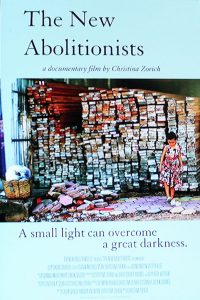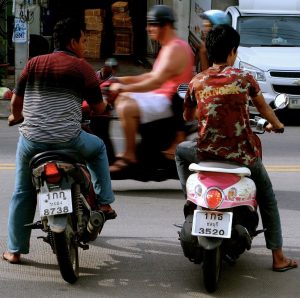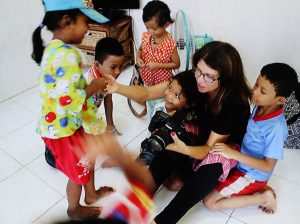‘The New Abolitionists’ more than a passion project for filmmaker Christina Zorich
 Actor/director Christina Zorich’s sex trafficking documentary, The New Abolitionists, screens at the Fort Myers Film Festival at 10:00 a.m. on Sunday, May 16. It’s an important film that tracks the efforts of four ministries and related NGOs (non-governmental organizations) to rescue children and teens who have been entrapped and enslaved in the sex trade in Cambodia and Thailand. With over 11 million sex slaves, Asia is considered the most trafficked region in the world.
Actor/director Christina Zorich’s sex trafficking documentary, The New Abolitionists, screens at the Fort Myers Film Festival at 10:00 a.m. on Sunday, May 16. It’s an important film that tracks the efforts of four ministries and related NGOs (non-governmental organizations) to rescue children and teens who have been entrapped and enslaved in the sex trade in Cambodia and Thailand. With over 11 million sex slaves, Asia is considered the most trafficked region in the world.
The documentary puts boots on the ground in spite of the risk to both the filmmakers and the members of the NGOs they followed. In fact, Zorich’s mother, Olympia Dukakis, warned her at the outset of the project to protect herself. The threat not only came for the criminal organizations and pimps  responsible for conducting the sex trade in those countries, but from government officials and agencies who routinely provide cover for their operations. In Thailand’s case, for example, the economy is so dependent on tourism that the government doesn’t just turn a blind eye to the human trafficking going on within its borders. They’re complicit.
responsible for conducting the sex trade in those countries, but from government officials and agencies who routinely provide cover for their operations. In Thailand’s case, for example, the economy is so dependent on tourism that the government doesn’t just turn a blind eye to the human trafficking going on within its borders. They’re complicit.
But Zorich was willing to risk her safety for the sake of the film, professing that The New Abolitionists is beyond a  “passion project” for her.
“passion project” for her.
While the street level scenes are certainly harrowing, most of the stories that the filmmakers share come compliments of in-studio interviews. They are poignant, heartbreaking and infuriating. Worse, they are representative of millions of similarly-situated young women and men. Anyone can find themselves  a sex slave. Many young girls and women are tricked into prostitution. Others are sold into slavery by their own families or villages. Even more are drugged, abducted or blackmailed.
a sex slave. Many young girls and women are tricked into prostitution. Others are sold into slavery by their own families or villages. Even more are drugged, abducted or blackmailed.
The film took Zorich several years to complete. She made her first trip to the region in 2015, testing the footage she got with various focus groups following her return.  She also prepared for the trip back to the region by taking an online course to learn how to be a better documentarian.
She also prepared for the trip back to the region by taking an online course to learn how to be a better documentarian.
With a career as an actor, acting instructor, director and producer spanning three decades, research has become a way of life for Zorich. But the research she did for this film extended way beyond merely learning the fine points of documentary filmmaking. She also researched and investigated every  aspect of human trafficking.
aspect of human trafficking.
Zorich traces her interest in the subject to a Christmas party she attended in 2012. She met a woman by the name of Erica Greve, who told her about the young victims of human trafficking that she’d encountered through Unlikely Heroes. Greve was dedicating  all of her time and resources toward building, staffing and operating homes for victims who’d escaped sexual enslavement, but felt it important to raise awareness about the plight of human trafficking and sex trade victims.
all of her time and resources toward building, staffing and operating homes for victims who’d escaped sexual enslavement, but felt it important to raise awareness about the plight of human trafficking and sex trade victims.
Zorich was sympathetic, and provided Greve with numerous contacts within the entertainment industry who might be able to help. But everyone Greve contacted asked to be paid to make a documentary drawing attention to the problem. So Zorich decided to shoot the film herself and sold some property in New  York City to fund the project.
York City to fund the project.
“I deeply believe that when an evil is revealed to us it is our earthly responsibility to do all we can to stop it,” said Zorich in a statement on Indiegogo, which she used to raise the funds she needed to complete post-production. “It is what makes us MOST human.”
The filmmaker and her  team returned to Cambodia and Thailand in 2016 and shot an additional 600 hours of footage. She’d originally tagged along with a ministry committed to eradicating human sex trafficking, but they introduced her to others and, in the end, the film follows four like-minded NGO anti-trafficking groups who are on the frontline of the fight.
team returned to Cambodia and Thailand in 2016 and shot an additional 600 hours of footage. She’d originally tagged along with a ministry committed to eradicating human sex trafficking, but they introduced her to others and, in the end, the film follows four like-minded NGO anti-trafficking groups who are on the frontline of the fight.
Zorich got so  much material on this second trip that it took her three years to pare the footage into a 98-minute film. The results were worth the effort. The New Abolitionists involves more than the mere presentation of tragic human trafficking stories. The film delves into the causes of the problem, and it presents practical solutions.
much material on this second trip that it took her three years to pare the footage into a 98-minute film. The results were worth the effort. The New Abolitionists involves more than the mere presentation of tragic human trafficking stories. The film delves into the causes of the problem, and it presents practical solutions.
“Our journey  brings us to the solutions for which our missionary protagonists are fighting: the rescuing, rehabilitation, prevention and prosecution of the problem,” Zorich states. “The movie ends with hope—the ultimate awakening of consciences all over the world. Every single person has a role to play, and everyone can do something about it.”
brings us to the solutions for which our missionary protagonists are fighting: the rescuing, rehabilitation, prevention and prosecution of the problem,” Zorich states. “The movie ends with hope—the ultimate awakening of consciences all over the world. Every single person has a role to play, and everyone can do something about it.”
The film has so far enjoyed a successful festival run. In addition to the Fort Myers Film Festival, The New Abolitionists has screened at the Los Angeles Women’s Film Festival, Malibu Film Festival and Beloit International Film Festival.
April 8, 2021.














 Tom Hall is both an amateur artist and aspiring novelist who writes art quest thrillers. He is in the final stages of completing his debut novel titled "Art Detective," a story that fictionalizes the discovery of the fabled billion-dollar Impressionist collection of Parisian art dealer Josse Bernheim-Jeune, thought by many to have perished during World War II when the collection's hiding place, Castle de Rastignac in southern France, was destroyed by the Wehrmacht in reprisal for attacks made by members of the Resistance operating in the area. A former tax attorney, Tom holds a bachelor's degree as well as both a juris doctorate and masters of laws in taxation from the University of Florida. Tom lives in Estero, Florida with his fiancee, Connie, and their four cats.
Tom Hall is both an amateur artist and aspiring novelist who writes art quest thrillers. He is in the final stages of completing his debut novel titled "Art Detective," a story that fictionalizes the discovery of the fabled billion-dollar Impressionist collection of Parisian art dealer Josse Bernheim-Jeune, thought by many to have perished during World War II when the collection's hiding place, Castle de Rastignac in southern France, was destroyed by the Wehrmacht in reprisal for attacks made by members of the Resistance operating in the area. A former tax attorney, Tom holds a bachelor's degree as well as both a juris doctorate and masters of laws in taxation from the University of Florida. Tom lives in Estero, Florida with his fiancee, Connie, and their four cats.